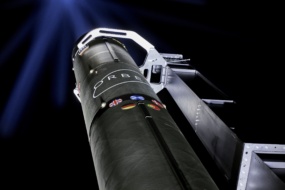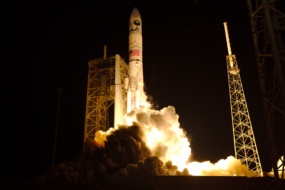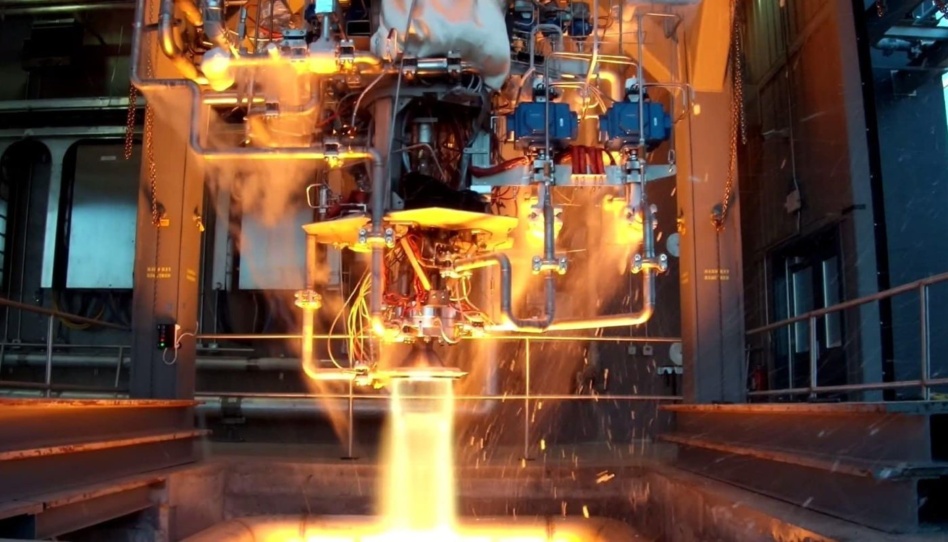Promin Aerospace, a small launch company from Dnipro, Ukraine, opened its doors in Brunswick, ME, this month, with a goal of hiring US engineers to complete development of its first rocket in time for a test launch in mid-2026.
Promin’s goal of launching Ukraine’s first rocket from the coast of the Black Sea was put on hold after Russia invaded the country in February 2022, but its move to the US has given the company a second chance to get off the ground.
Seeking refuge: For the past two and a half years, Promin has been developing its unique rocket technology amid power outages, internet connectivity problems, and sporadic attacks on Dnipro from Russian forces. Early on in the war, the company recognized it would need a new home to conduct flight tests and complete the build of its rocket.
The search started in Europe but quickly moved across the pond to take advantage of the speed and resources that US industry provides.
“[Europe moves] very slow, so a lot of things that we expected would be done by our partners in 2022, they’re only going to be done in 2025,” Misha Rudominski, Promin’s co-founder and CEO, told Payload. “We don’t really have the budget to go this slow, we’ll burn through money before we are able to reach any milestones with this speed.”
The US, on the other hand, was able to give Promin immediate access to the facilities and resources it would need to grow on a timeline that made financial sense.
While looking for options in the US, Alexandra Gladyshevskaya, Promin’s chief business development officer, came across the Maine Space Corporation’s website by chance. While the state is just getting started building a space economy, it has everything that Promin needed.
This month, Gladyshevskaya set up the company’s office in the Brunswick Landing TechPlace, Maine’s technology innovation center. A former Naval Air Station, the facility has everything a small launcher could hope for, including a 1,100-acre aviation facility, 500,000 sq ft of hangar space, ample room to run rocket engine tests, and future plans to build out manufacturing and R&D spaces.
Brunswick Landing is also the home of the Maine Space Corporation and Maine’s other small launch company, bluShift Aerospace.
Remote manufacturing: Promin’s plan is to hire as many as a dozen US engineers in the coming year who will build its first rocket, Promin 1, with guidance from the engineers who remain in Ukraine. The US team will physically build the rocket, while the team in Ukraine conducts analysis and R&D.
The US engineers won’t simply be remote hands for the Ukrainian team, however. Instead, they’ll be active participants in the final construction of a rocket ready for US customers.
“In Ukraine, we have very, very good knowledge of engines…but we haven’t got experience of actually operating and doing the control, the guidance, the actual final thing of the orbital and suborbital rockets,” Rudominski said. “There is a big opportunity to build the technology outside of the US, but then build the product, the rocket, in the US.”
The company also benefits from the fact that much of its rocket technology can be 3D printed or purchased off-the-shelf, meaning that supply chains in the US are ready to support the build without extensive lag time.
Burning the candle at both ends: The rocket is the brainchild of cofounder and CTO Vitaly Yemets, a professor at the Oles Honchar Dnipro National University who started his career at the Korolev Rocket and Space Corporation under the Soviet regime.
Yemets’ idea for Promin 1 was to use autophagic technology, where the rocket’s fuel tank is made of the same solid-propellant high-density polyethylene fuel that will provide the rocket with lift.
During launch, the solid propellant, the oxidizer, and the fuel tank are designed to burn together. This means that the rocket gets smaller as it gains altitude, shrinking like a burning candle until all that remains is the payload fairing attached to the engine.
The end result of this technology is an extremely small launch vehicle, capable of launching 20 kg suborbitally, or 3 kg to orbit for around $150,000-$200,000 a launch.
Promin is confident that there is a large market of picosat and nanosat customers looking for dedicated launches on tight timelines. The past few years, the DoD has made tactical launch capabilities a priority, but Promin’s cofounders believe there’s also ample demand from the commercial sector to validate technology on a much tighter timeline.
“You can launch much faster, thus saving a lot of money on the payroll,” Rudominski explained. “You can build a CubeSat in three months…and then sometimes you need to wait for a year, year and a half to launch it.”
What’s next: Promin plans to launch its first suborbital flight test from Maine by mid-2026. Reaching this milestone will require a lot of hard work on both sides of the Atlantic and a fair amount of good fortune.
For the team in Ukraine, the war’s encroaching front-line is a constant concern. Since the initial invasion, two of the company’s engineers have left to join the fighting force. While Promin is in talks with the government to keep the rest of their engineers from conscription, there is a fear that this reality may change if the war drags on.
The company’s contingency plan if the fighting comes to Dnipro amounts to packing everything in a car and driving west. They’re also considering hiring Ukrainian engineers—women or older men—who may be able to continue the work if current employees are pressed into service.
But if all goes well, the company has plans for expansive growth on a global scale. Promin envisions ever larger rockets to bring heavier payloads to orbit and hopes to offer launch capabilities to smaller nations looking to build a presence in space, including in South America and Africa.
The end goal remains to one day launch the first Ukrainian-built rocket from Ukrainian soil.
“The goal [and] the direction didn’t change, we had to slow down the pace a bit, but I hope with our entrance to the US market, we can pick up the pace and accelerate much, much further,” Rudominski said.





